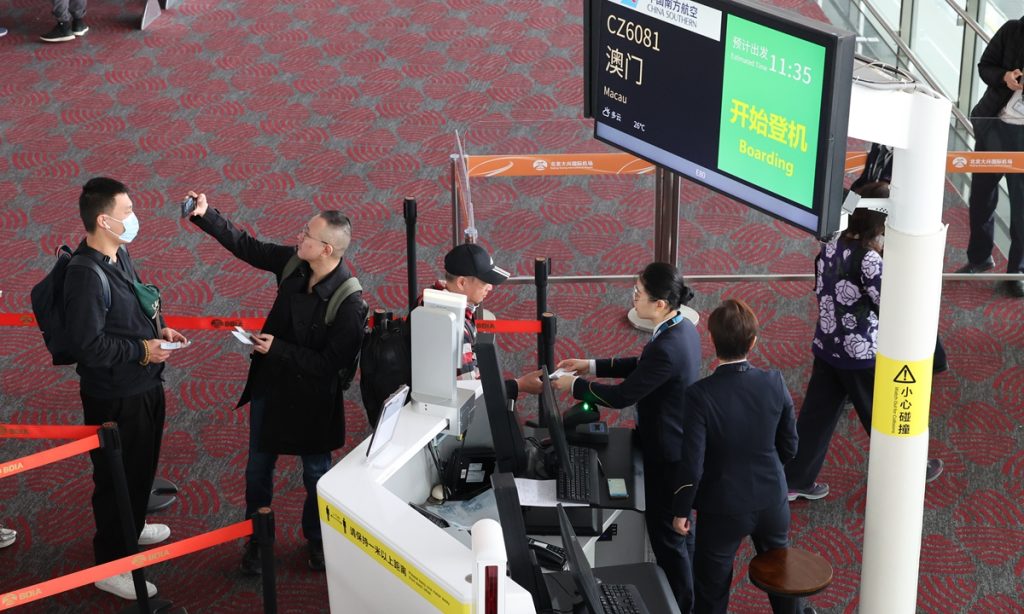Macao welcomes first tour group under Hengqin-Macao multiple-entry visa policy

As the Hengqin-Macao multiple-entry visa policy took effect on Monday, Macao welcomed the first tour group from the Chinese mainland. The plan, launched by China's National Immigration Administration (NIA), was designed to enhance personnel and business exchanges between Macao and Hengqin, an island in Zhuhai, South China's Guangdong Province.
The policy will bolster tourism and trade, and shore up consumption in sectors such as tourism, dining and accommodation, not only in Macao but also across the entire Guangdong-Hong Kong-Macao Greater Bay Area (GBA). This process will drive local economic growth and accelerate the integration of the GBA, experts said.
The 16 members in the first tour group primarily came from mainland provinces such as Guangdong, Hubei, Shaanxi and Shanxi. The group has a three-day, two-night itinerary spanning Macao and Zhuhai, with two entries into Macao scheduled during the journey, according to a statement the Hengqin authorities sent to the Global Times on Monday.
The implementation of the visa expansion policy is poised to facilitate business cooperation in tourism, exhibitions and other sectors between the two sides, a local official from Hengqin said on Monday during the welcome reception for the tour group. The official stressed that "it will bolster Macao's position as a global tourism hub and expedite Hengqin's transformation into an international leisure destination."
Against the backdrop of China's high-level opening-up, exchanges between the Chinese mainland and Macao hold great significance. Serving as an international commercial hub, cooperation with the mainland enables both sides to share resources and advantages, Liang Haiming, chairman of Hong Kong-based China Silk Road iValley Research Institute, told the Global Times on Tuesday.
At the end of April, China's NIA announced new entry-exit regulations to streamline residents' trips outside the mainland. Among the highlights was permission for mainland visitors who join Hengqin-Macao tour groups to make multiple trips between Hengqin and Macao within seven days.
The sweeping policy package includes full online processing for renewing travel documents within seven days and intelligent expedited processing for business visas, allowing extended stays in Hong Kong and Macao of up to 14 days. It also offers more visa options for professionals working in Macao, with stays of one to five years, according to the NIA.
The robust measures represent a comprehensive overhaul of local tourism strategies, Maria Helena de Senna Fernandes, director of the Macao Government Tourism Office, said on Monday. The moves will bolster the hospitality sector as well as food and beverage operations, alongside related services, Macao Daily Times reported on Tuesday.
As anticipated, the policy sparked widespread responses in related sectors. Macao-owned enterprises based in Hengqin expressed great optimism about the policy, which is expected to prioritize travelers' options for tourism products. They believe that the Guangdong-Macao in-depth cooperation zone in Hengqin can serve as a supplement to Macao's tourism resources to meet diverse market demands.
Multiple travel agencies have sought guidance on the criteria and processes for obtaining qualifications, according to Hengqin's statement. The cooperation zone will evaluate the number of agencies in line with regulations and announce assessments in stages.
The integrated development of the GBA is on a fast track. During the just-concluded five-day May Day holidays, Hong Kong witnessed a tourism surge, with mainland visitors exceeding 750,000, official data showed. Macao received an average of 120,879 visitors daily, a figure described by Senna Fernandes as "quite good" given the stormy weather during the holidays.
China's central authorities issued a general plan in 2021 for building a Guangdong-Macao in-depth cooperation zone in Hengqin, which is expected to be a major arrangement to enrich the practice of One Country, Two Systems, and serves as an important driving force for Macao's long-term development.